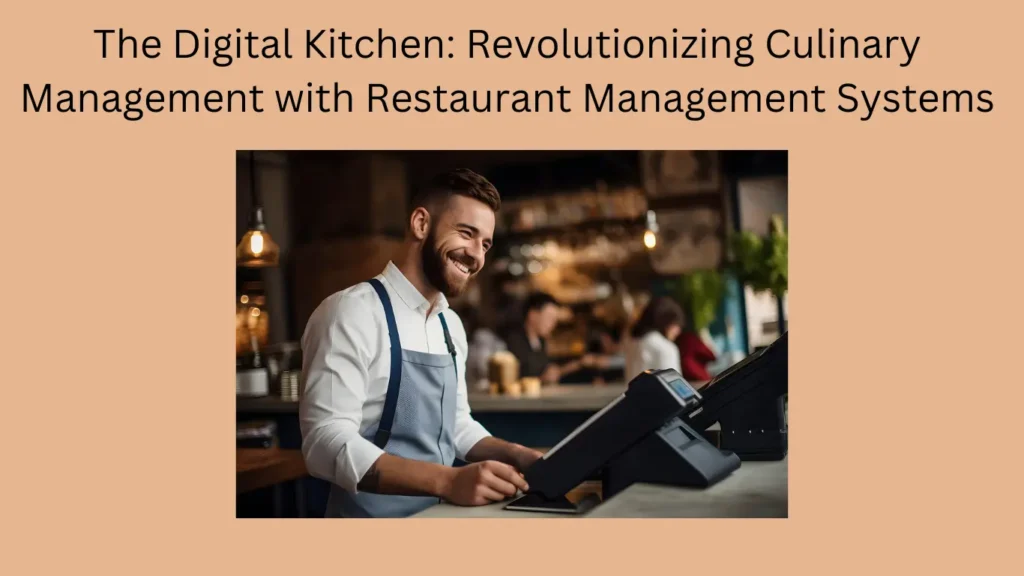In the fast-paced world of culinary arts, managing a restaurant efficiently is paramount to ensuring success. With the advent of technology, restaurant management systems (RMS) have emerged as powerful tools that revolutionize how restaurants operate. In this guide, we’ll explore the transformative impact of RMS on culinary management and how they can help restaurant owners and managers optimize their operations, enhance customer experiences, and boost profitability.
Understanding Restaurant Management Systems
A Restaurant Management System is a comprehensive software solution designed to streamline various aspects of restaurant operations. From inventory management to point-of-sale (POS) transactions, RMS integrates multiple functions into a single platform, allowing restaurant owners and managers to manage their businesses more effectively.
Key Features of Restaurant Management Systems
- Point-of-Sale (POS) Integration: Modern RMS includes advanced POS systems that facilitate smooth and secure transactions, track sales, and generate detailed reports.
- Inventory Management: RMS helps in keeping track of inventory levels, managing suppliers, and reducing food waste by providing real-time updates and alerts.
- Table Management: Efficiently manage reservations, optimize table turnover, and enhance customer service with table management features.
- Employee Scheduling and Management: Automate scheduling, track employee hours, and streamline payroll processes to ensure optimal staffing levels.
- Customer Relationship Management (CRM): Build and maintain customer relationships by leveraging CRM features to track customer preferences, manage loyalty programs, and send personalized promotions.
- Reporting and Analytics: Gain insights into sales trends, customer behavior, and operational performance with comprehensive reporting and analytics tools.
Benefits of Implementing Restaurant Management Systems
- Enhanced Efficiency: RMS automates repetitive tasks, reduces human error, and streamlines operations, allowing staff to focus on delivering exceptional customer service.
- Improved Inventory Control: Real-time inventory tracking helps prevent overstocking or understocking, reducing waste and saving costs.
- Better Customer Experience: Efficient table management, quick order processing, and personalized service enhance the overall dining experience for customers.
- Data-Driven Decisions: Access to detailed reports and analytics enables restaurant owners and managers to make informed decisions that drive growth and profitability.
- Cost Savings: By optimizing inventory, reducing waste, and automating administrative tasks, RMS helps restaurants save on operational costs.
- Scalability: Whether you run a single outlet or a chain of restaurants, RMS can scale with your business, providing consistent performance and reliability.
Implementing a Restaurant Management System: Best Practices
- Identify Your Needs: Assess your restaurant’s specific requirements and choose an RMS that aligns with your operational goals and budget.
- Train Your Staff: Invest in training programs to ensure your staff is well-versed with the new system and can utilize its features effectively.
- Integrate with Existing Systems: Ensure that the RMS you choose can seamlessly integrate with your existing hardware and software systems.
- Monitor and Evaluate: Regularly monitor the system’s performance and gather feedback from your staff to make necessary adjustments and improvements.
- Stay Updated: Keep your RMS updated with the latest features and security patches to maintain optimal performance and protect against cyber threats.
Conclusion
Restaurant Management Systems are revolutionizing the way culinary businesses operate, offering a myriad of benefits from enhanced efficiency to improved customer experiences. By embracing these digital solutions, restaurant owners and managers can streamline their operations, make data-driven decisions, and ultimately achieve greater success in the competitive culinary landscape.
For further Inquires Contact Us
FAQs
What is a Restaurant Management System (RMS)?
A Restaurant Management System (RMS) is software designed to streamline various restaurant operations, including POS transactions, inventory management, employee scheduling, and customer relationship management.
How can RMS improve inventory management?
RMS provides real-time inventory tracking, alerts for low stock levels, and data on usage patterns, helping reduce waste and avoid overstocking or understocking.
Can RMS enhance the customer experience?
Yes, RMS can improve customer experience by enabling efficient table management, quick order processing, and personalized service through customer relationship management features.
Are Restaurant Management Systems scalable for growing businesses?
Absolutely. RMS can scale with your business, supporting single outlets or multiple locations, ensuring consistent performance and reliability as your restaurant grows.
What are the cost-saving benefits of using an RMS?
RMS helps save costs by automating administrative tasks, optimizing inventory, reducing food waste, and improving overall operational efficiency.

